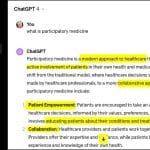On social media and at meetings like Health Datapalooza, our favorite federal bureaucrats assure us of their commitment to open data and patient empowerment. But those are just soothing words; federal regulations are law.
On April 30, I posted on e-patients.net an article entitled, “You Won’t Believe What Medicare Just Did on Patient Engagement!” In it, I showed how the long-awaited draft regulations for the implementation of the Medicare and CHIP Reconciliation Act (MACRA) were extraordinarily weak in the requirements related to using electronic health records for patient engagement. I concluded the post by pointing out that the comment period on the draft rule – that is, the formal opportunity to influence the final rule – ends June 27. Just to be reinforce the importance of commenting, the physician reimbursement rules Medicare is setting forth in MACRA will play a major role in the U.S. health care system’s transformation from fee-for-service to value-based payment.
You can read the entire text of the proposed rule here, but I’d strongly suggest that you use “Search” to look only at patient engagement-type activities. (My April 30 blog post talks about some of the most important.) The next step is to go to www.regulations.gov to comment. (Again, use “Search” to can find the MACRA draft rule; I put “MIPS” into the search box.) Commenting is as simple as placing text into a box and then adding your contact information.
I both criticized the draft and suggested replacement language. If you agree with it (see below), you may want to recommend that language, as well. Or you may very well have much better suggestions. In any event, I encourage the Society of Participatory Medicine as an organization and all SPM members to make your voices heard.
Other groups have other agendas. It’s up to us to tell Medicare we won’t accept tokenism on MACRA.
Here is the text of my comment:
To Whom It May Concern:
This email is to formally comment on the Centers for Medicare & Medicaid Services (CMS) proposed rule 81 FR 2816, Agency Docket No. CMS-5517-P, related to the Medicare Access and CHIP Reauthorization Act (MACRA).
As someone who has worked extensively in the areas of informatics and of patient-centered care, I find the proposed standards related to use of certified electronic health records (EHRs) in the section entitled “Coordination of Care Through Patient Engagement” disappointingly weak and unlikely to achieve its goal. As an October, 2015 white paper co-authored by me and Dr. Robert Berenson of the Urban Institute noted, MACRA contains legislative language specifically assigning priority to outcomes measures that include patient-reported outcome and functional status measures and patient experience measures. (On the Urban Institute website, see: “The Road to Making Patient-Centered Care Real: Policy Vehicles and Potholes.”) Moreover, patient-centeredness is an official part of the National Quality Strategy to which CMS is supposed to adhere.
Yet under “patient engagement,” the proposed rule requires the following:
- “During the performance period, at least one unique patient (or patient-authorized representatives) seen by the MIPS eligible clinician actively engages with the EHR made accessible by the MIPS eligible clinician.”
- “For at least one unique patient seen by the MIPS eligible clinician during the performance period, a secure message was sent using the…EHR….”
- “Patient-generated health data or data from a non-clinical setting is incorporated into the certified EHR technology for at least one unique patient….”
Those are just a few of the examples where the phrase “one unique patient” refers to requirements over the period of an entire year.
To illustrate the inadequacy of this proposed rule in relation to the stated goal of engaging patients in their care, imagine a rule promoting integration that required all-white schools to include “at least one unique black pupil.” Or, in the fight for gender equality, an all-male club being sternly told it can’t keep its government-issued liquor license unless it includes “one unique female member over the course of each year.” Just as these requirements would be utterly inadequate on their face, so, too, are the proposed “one unique patient” MIPS rules. They do little more than “signify” sympathy with patient-centeredness.
I am aware that this language rule aligns with similar wording about Meaningful Use from the Office of the National Coordinator of Health Information Technology. That is a history lesson, not a rationale. In contrast to the ONC proposals, CMS’s final rule for Medicare Shared Savings Program ACOs (CFR 425.112) has a much more proactive approach towards patient-centeredness that MACRA, as another value-based payment program, would do well to emulate.
Rather than set an arbitrary numerical goal in regard to patient engagement, I suggest CMS use a descriptor such as “regularly.” As in, “During the performance period, patients or patient-authorized representatives seen by the MIPS eligible clinician are regularly engaged with the EHR made accessible by the MIPS eligible clinician.” If the agency believes “regularly” would be unduly burdensome, perhaps a lawyerly modifier such as “regularly, to the extent practicable,” might be used. This type of language, or some other strengthening, would represent a much-needed improvement over the current tokenism.
(By the way, “MIPS-eligible” is an adjectival phrase modifying “clinician,” and it takes a hyphen. Since an official regulation will be reproduced exactly, CMS may want to engage a good copy editor before issuing the final rule.)
This preliminary rule represents a critical first step in implementing the transformation of physician reimbursement from fee-for-service to value-based payment. The requirements focusing on patient-centeredness (and they go beyond what I have specifically mentioned here) are important to me as someone involved in health policy; as an activist who is a former board member of the Society for Participatory Medicine; as a researcher; and in my personal life. I see from personal and professional experience how CMS regulations can promote patient engagement that would not otherwise occur.
While MACRA is complex, the imperative to truly place the patient at the center is clear, reflecting the will of Congress and the oft-stated priorities of this administration. As President Obama said in his June 8, 2010 Town Hall with seniors, health reform includes a “patient-centered medical system.” I respectfully urge you to strengthen the current language.
My thanks for the opportunity to comment.
Regards,
Michael Millenson






Michael:
I enjoyed your analogies and agree that “one unique patient” is indeed something that requires correction. Please note, however, that the MU language to which you refer is not from ONC. This language, like that in the MACRA NPRM, is from CMS. ONC’s regulations apply to the standards and certification criteria for health IT, and not MU itself.
Thank you for the clarification. Interesting division of regulatory labor.